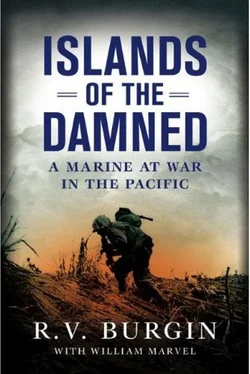She chased him all the way across the yard and under the fence, where he got hung up on the barbed wire.
J.D. and I used to go fishing together, and possum hunting at night with the dogs and a .410 shotgun. He was with me when I shot my first deer.
According to the telegram, J.D. had been killed by German artillery in Alsace-Lorraine. An Army officer wrote my folks that it had been sudden. J.D. hadn’t felt a thing.
* * *
Nights on the deck of the McCracken were cool and pleasant as we sailed north from Ulithi. We could almost forget we were getting closer to Japan. But a briefing from K Company’s officers sobered us right up. Okinawa would be the bloodiest campaign of the war, they warned us. We could expect 80 to 85 percent casualties.
Going in we would face heavy fire from a large Jap gun on the beach. Enemy paratroopers might drop in behind us, and there would probably be a banzai attack during our first night ashore. We were also facing a new tactic. Starting in October of 1944, Japanese pilots had been deliberately crashing their planes into American warships in a kind of aerial banzai attack.
The convoy that left Ulithi March 27 was the largest ever assembled in the Pacific. We had almost 1,300 ships of all kinds and more than 180,000 men from five Army divisions—the Seventy-seventh, Ninety-sixth, Twenty-seventh, Seventh and Eighty-first—and the First, Second and Sixth Marine divisions. We were facing at least 100,000 Jap troops who, we knew, would fight to the last man. Their back was to the wall.
The old bivouac rumor about the Marines being absorbed into the U.S. Army almost came true, in a way. The entire invasion force, called the Tenth Army, was under the command of Army Lieutenant General Simon Bolivar Buckner.
Because the Fifth Marines’ Third Battalion had been in the first wave at Peleliu, we were to be spared that distinction at Okinawa. We’d be held offshore in regimental reserve.
It had now been sixteen months and a couple days since Florence and I sat on that park bench in Melbourne kissing and saying our good-byes. I was no closer to returning for her as I’d promised, no closer to settling down in our little house together. In fact each island where I’d fought took me farther from her. How long would I be on Okinawa? And then where? Japan? We knew as we were getting closer that the enemy was getting weaker and more desperate. Standing there at nights on the deck of the McCracken , I just couldn’t see any end to it.
We awoke once again to the smell of steak and eggs from the galley. Sunrise was still two and a half hours away, but crews aboard the McCracken were already at their battle stations. Jap planes did not wait for the light of dawn before starting their bomb runs and kamikaze attacks. We’d been warned the night before to get plenty of rest because April 1 was going to be a long, hard day. I had slept pretty good, but I’d been through this twice before, three times if you count Ngesebus. Losing sleep did not make any landing easier.
It was Easter Sunday. And it was April Fools’ Day. After the usual clatter and commotion of getting everybody up and collecting our gear, we assembled for a chapel service. I don’t remember any of the details or what was said to us. But I’m sure many of us prayed very sincerely that morning. We stood in line for the mess hall, stood in line for the heads, and by twos and threes climbed to the deck.
The temperature was in the mid-seventies. It was going to be the kind of balmy, clear morning that back home would have sent me out into the woods with the dog and my hunting rifle. J.D. would probably have come along. The ship faced east and as the horizon got brighter, we could make out a long, low landmass silhouetted a few miles away with an umbrella of smoke hanging over it. We could hear the hum of airplanes getting closer and the bark of ack-ack guns from other ships. For several days we had watched as streams of plump B-24s droned high above, paying an advance call on Okinawa, but this time the approaching planes weren’t ours.
“All troops below!” some sailor yelled. “No troops on deck! Captain’s orders. Jap planes coming! We don’t want Marines killed on our deck. Everybody get below.”
Did the Navy think we’d never been under fire before? Swabbies were always hassling Marines. You’d find a shady cubbyhole to snooze and the first thing you knew some swabbie would come along with a hose to wash down the deck. We figured this was more of the same.
The McCracken ’s 40mm antiaircraft guns started bellowing. Over our heads the silhouettes of planes came snarling over, swooping and darting like barn swallows. Flashes popped among them, and inky blots of smoke drifted away.
We were herded through a hatch and a sailor slammed it shut. The space we found ourselves in was dark and crowded. We were wearing full packs, and there was no ventilation. Before long we were hot as blazes. We could hear the racket above our heads and none of us wanted to be caught like pigs in a pen if a Jap plane or bomb came crashing through the deck. We started yelling for someone to let us out. Finally a bunch of us took matters into our own hands and battered the hatch open and we all came swarming out, the battle going full blast around us.
A Naval officer appeared on the deck above and behind us. “All Marines, return to quarters!” he barked. “That’s an order! Do it now!”
“Sir, we’re about to hit that beach. We’d just as soon take our chances out here.”
He turned and strode away. While we milled around waiting for what might happen next, a couple of our own officers showed up and ordered us to stand by for loading. We formed up at the railing four abreast and waited for the signal to turn and scramble down the cargo nets. Climbing those things you try to make haste carefully. You hope the guy above you doesn’t step on your hands or face, and you try to not step on the hands or the face of the guy below you.
When the amtrac was full, I called out, “Shove off, Coxswain. You’re loaded.” We nosed away from the ship and joined the line of other amtracs headed out to the assembly point just outside the reef until the signal came to form up and go in.
While we waited we watched the air show. A Jap plane nosed over and fell toward the sea, twisting and trailing a long spiral plume of smoke until it smacked the water. Another burst into flame and disappeared behind the hulk of the McCracken. Hellcats went weaving through the smoke and din, and we held our breath hoping the gunners on those ships knew their planes and aimed accurately. A lot of shipboard gunners, we knew, were our guys, Marines.
The Navy’s big guns and rocket-launching LSMs were still working over the beach and beyond, planting long, even rows of explosions along the shore. Thunder swept across the waves and beat against our faces. Amtracs and Higgins boats headed this way and that. Many had already left troops on the beach and were headed out for another load or for supplies. The Fifth Marines’ First and Second battalions were already landing on Blue Beach to our left. Our battalion was to have been held back in regimental reserve. But obviously they were sending us in along with everyone else to anchor the left flank on Yellow Beach. To the south a muddy river, the Bishi Gawa, separated us from Purple Beach, where the Army’s regiments were coming in.
When the flag dropped we formed a wide line and started across the reef. Ships were pumping out clouds of white smoke, screening our approach. A few gray spikes erupted in the water in the distance. But so far we hadn’t seen any of the burning amtracs that had made the trip into Peleliu such a nightmare. The Navy bombardment had ceased. In the quiet we could hear the rumble of amtrac engines all around us. Little by little Okinawa appeared through the haze and smoke. From my perch on the gunwale, I could make out ground sloping up from the beach and a patchwork of fields separated by rows of pine trees. Except for columns of rising smoke here and there it looked like nice farm country, a little like the countryside around Melbourne.
Читать дальше











